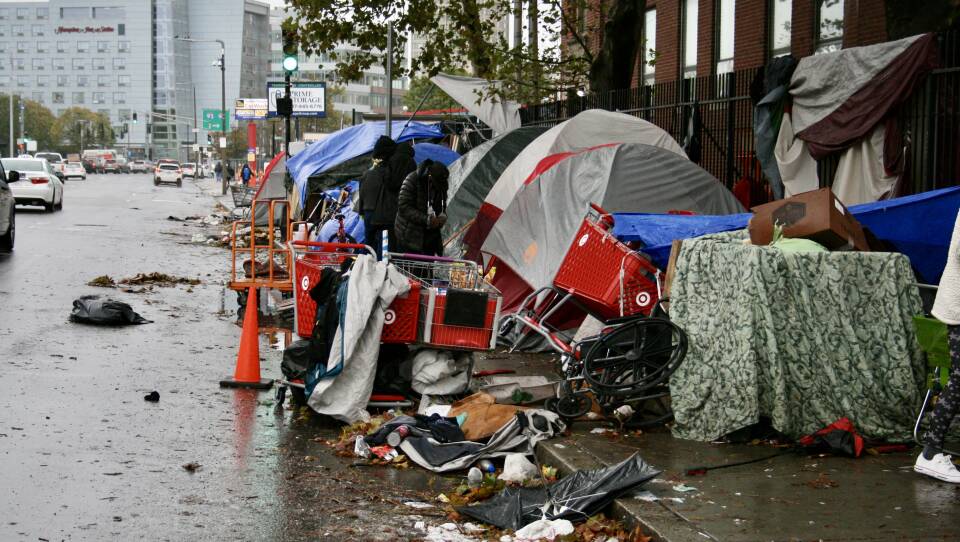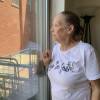As a freezing downpour drenched the gutters of Melnea Cass Boulevard Wednesday, people living in a long stretch of makeshift encampments helped one another to rebuild: hanging up tarps and resetting tents that had blown over in the storm.
Around the corner from his own tent, Taz, who asked GBH News not to use his last name, helped a group of people to reconstruct their broken-down structure, a bundle of wet sheets between an abandoned grocery cart and a tent with “shoes off please” written in Sharpie at the entrance.
“These are our homes,” Taz told GBH News. “They wouldn’t ask you to take down your house.”
Boston officials are beginning what they call a “general cleanup” of the streets around Massachusetts Ave and Melnea Cass Boulevard, or Mass and Cass, removing tents and encampments in accordance with an executive order issued last week by Acting Mayor Kim Janey .
If offered an apartment or other independent living option, Taz says he would gladly move off the street. But absent those choices, he’ll stay put as long as he can.
“I’d rather live outside than live in a shelter,” Taz told GBH News. “Shelters have creeps, shelters have rapists, shelters have people who don’t shower and people who don’t appreciate working there, who are just there for a check. Who wants to live in a shelter?”

Janey said people will not be forced out of their tents if shelter space is not available, but there are roughly 150 tents on the street and at least that many empty beds in nearby city shelters.
“We understand that some individuals may refuse help that they are offered,” Janey told reporters at a news conference earlier this month. “In this instance, enforcement may be used, but only as a last resort.”
A group of doctors, medical experts and civil rights advocates spoke out against Janey’s plan at a news conference Wednesday, saying her approach will do more harm to people in the area who use drugs or experience homelessness.
“Displacing people, offering them ultimatums that include only a congregate shelter, medically supervised withdrawal or being funneled into a correctional setting will worsen the public health crisis we are seeing,” said Dr. Sarah Wakeman, the medical director for Mass General Brigham’s substance use disorder initiative. “It violates that autonomy and trust of the very people we should be trying to serve.”
Wakeman also rejected the plan proposed by Suffolk County Sheriff Steve Tompkins that would allow people experiencing homelessness and substance use disorder to be involuntarily committed in an unused ICE detention facility nearby.
“Effective interventions for these issues exist, but they do not include displacing community members without meaningful and safer places to voluntarily go,” Wakeman said. “And they don't include compulsory detention in jail-based facilities.”
Wakeman and other advocates said the real need is for affordable housing.
“The only solution to houselessness is housing,” Wakeman said. “Both short-term immediate options, which could utilize hotels and vacant properties, and longer-term options for supportive housing without the current limitations.”

People who receive involuntary treatment are 2.2 times more likely to die of opioid-related overdoses than people who receive voluntary treatment, according to a 2016 study from the Massachusetts Dept. of Health. People who received involuntary treatment were also found to be 1.9 times more likely to die of any cause, according to the study.
Aezra El, an organizer with grassroots political group Act Up Massachusetts who quit two years of heroin use in 2015, experienced firsthand how having access to housing and healthcare can disincentivize drug use.
“Chaotic [substance] use can be a product of unmet needs that societies fail to meet, whether it be education, employment, mental health services or the response to trauma,” El told GBH News Wednesday.
El also said autonomy is critical in making the choice to end substance use.
“When you are subjected to a treatment that you didn’t volunteer for and you go through that treatment and it doesn't take, there can be feelings of, ‘I’m not curable,’” El said. “That’s often what’s drilled into our heads in those situations, that we are sick we need to be cured.”
More Local News
In a 2016 study published in the International Journal of Drug Policy, scientists found that “evidence does not, on the whole, suggest improved outcomes related to compulsory treatment approaches, with some studies suggesting potential harms.”
Dr. Todd Kerensky, president of the Massachusetts Society of Addiction Medicine, told reporters “we do not support increasing access to involuntary treatment in Massachusetts, given the lack of evidence for efficacy, potential harms and erosion of patient autonomy and health care.”
Both Tompkins and Attorney General Maura Healey have said that “all options should be on the table” for addressing the concentration of substance use and homelessness at Mass and Cass.
But Boston City Councilor Ricardo Arroyo said involuntary commitment in detox facilities should be off the table.
“We know that criminalizing addiction, criminalizing mental health and criminalizing poverty does not work, it has never worked,” Arroyo said. “We have decades of evidence, decades of data that show that it actually causes more harm. ... Public health and incarceration do not go hand in hand. They are opposites.”

Cassie Hurd, the executive director of Material Aid and Advocacy Program, suggested that people living on Mass and Cass should be offered housing vouchers as a short-term solution.
“In the absence of available housing vouchers, people need to be moved into non-congregate motels that meet their needs,” Hurd told reporters. “They need to be able to bring in a partner, practice harm-reduction philosophies and be able to care for each other. At the beginning and toward the middle of COVID-19 last winter, the state and city invested in hotel rooms. They can do the same again, we can find space.”
To address the piles of trash and human waste on the streets, Hurd said the city needs to provide public restrooms, dumpsters and trash cans to the community.
Taz agrees. “If there were more bathrooms or trash cans, things would be cleaner, more proper,” he said. “I clean my area and I clean my neighbors’ area, just to keep us united, so we stay together as a group.”








